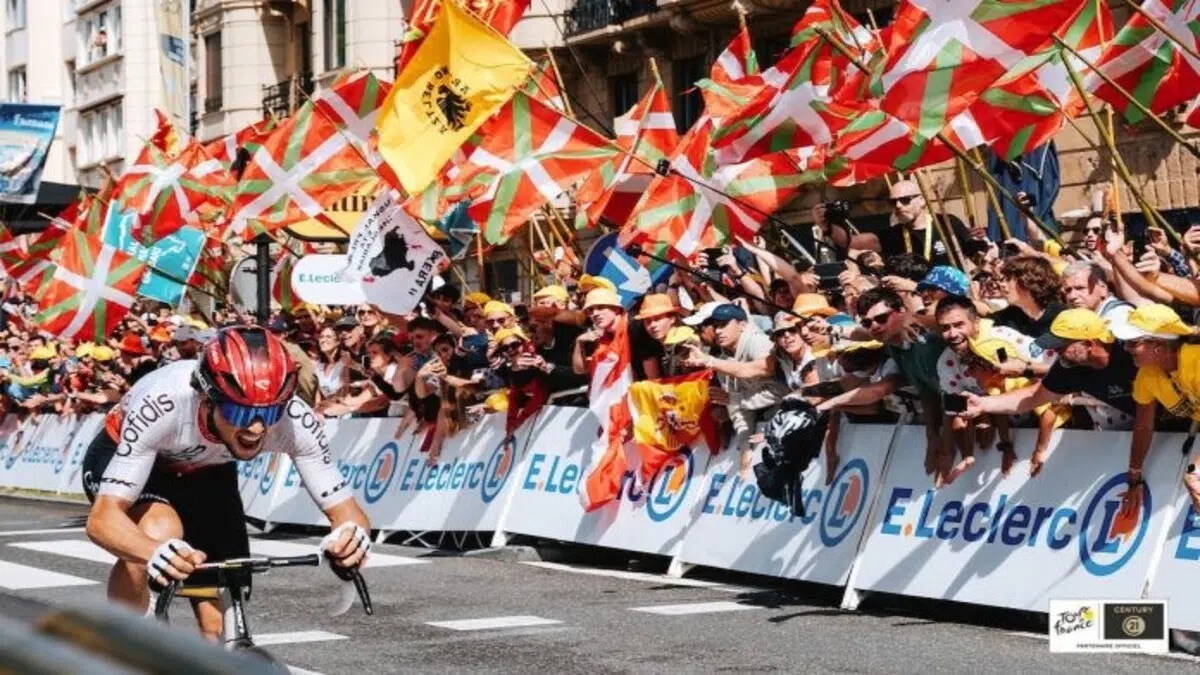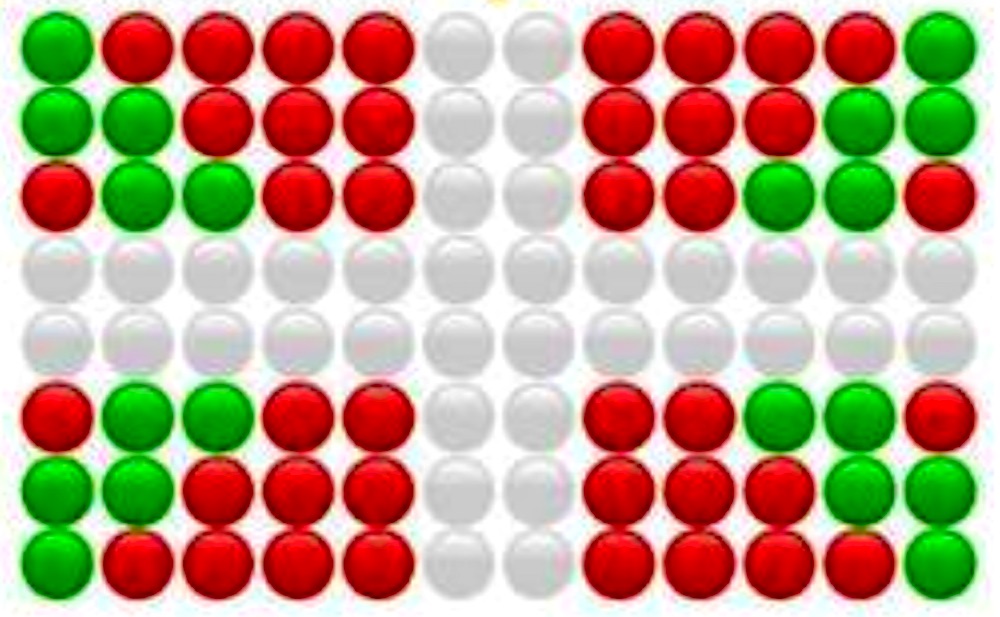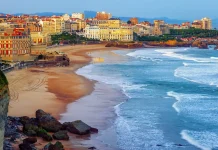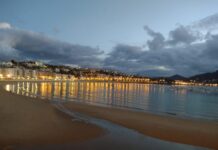The global reach the Basques achieved thanks to the départ and first three stages of the 2023 Tour de France being completely inside the borders of the Basque Country has been nothing short of extraordinary. After the Olympics, this is the live sports broadcast that has the most followers in the world.
From our point of view, undoubtedly that of an irresponsible person commenting from the sidelines, there were a few things we found lacking. For one, it never went through Navarre, and for another, the Basque authorities on the other side of the Pyrenees did not get to share in these stages.
But we are well aware of the logistical (to avoid using the word “political”) difficulties this would have caused. Sometimes the best isn’t the friend of what’s good, but what’s possible.
The Basque—Tour symbiosis has always been good, but this time it was better than ever. But the next time, we’ll have a few things to improve; one of those would doubtlessly be the inclusion of the Basque Cycling Team.
And given the insane number of articles and reports that have been written, we’ve been unable to collect all the articles that show off just how much reach the Basque Country received in those three days the Tour was coming through. But we were thinking about highlighting the enormous impact that viewers must have received on seeing the thousands and thousands of Basque flags, or ikurriñas, that were lining the roads wherever the cyclists went. We are simply beaming with pride at how Basque cycling fans along the length of the whole course showed off our flag, making it a key player over these days.
But our plans were changed because two things happened around the Tour’s trip through our country that simply must be commented on.
The first is the disgraceful article Alessandro Ruta published in the right-wing (Silvio Berlusconi-related) Il Giornale, just before the Tour set off.
The other regards the controversy that arose around a tweet the Tour’s official account published to congratulate Basque cyclist Peio Bilbao for his stage win, replacing the Spanish flag for the Basque one, the very same flag that accompanied all those cyclists for the three days they were touring the Basque Country.
Il Giornale and its lies
The Il Giornale article is the epitome of what happens when a journalist writes based on hearsay and the editor has no idea. We do hope Mr. Ruta knows more about sports than he does the Basques, because otherwise we can’t understand how he’s supposed to be writing about the former.
Such a delirious article could only have been written based on comments to him made over a drink by a member of the People’s Party which, lest we forget, is in the same European Parliament group (the European People’s Party) as Forza Italia, the party founded by Berlusconi. This all goes to show what is being said about the Basques by many political and institutional representatives of Spain.
The text is truly a work of creativity, if not truth. It starts with the subheading, claiming that “Bilbao has invested twelve million to set up the ‘Grande Bouche’ in the name of autonomy,” confusing Bilbao and the Basque Autonomous Community. He also contradicts himself when he says it’s being done in the name of “autonomy,” that its goal is economic, and that the Tour “is becoming a manifest of Basque independence.” Well, if you say that something is everything, you’re bound to get something right. Even broken clocks are right twice a day.
He also claims that the first three stages were completely within “Spain,” omitting that the third actually crossed into the Northern Basque Country end in Bayonne. So, it was 100% within the Basque Country.
He goes on to condemn the rise in prices brought on by the Tour, without, shockingly, mentioning that this happens along the whole route of the Tour, and the Giro d’Italia, and the Vuelta a España. He’s even surprised that Basque broadcaster EITB was in charge of handling the broadcast of the three stages.
He’s also quite “surprised” that none of the stages traveled through Eibar. Could they have? Of course, but it would seem that the organizers from both the Tour itself and the Basque governments involved decided to opt for other routes. These first three stages have traveled through towns with councils run by the whole gamut of political parties. Indeed, both stages 2 and 3 passed through Irún, which is governed by the same party that’s in charge in Eibar. Perhaps one needs to seek not “political ghosts” but more technical and aesthetic reasons.
As for the fact that the Tour never went through Navarre, it would seem that one would have to ask the Navarrese government, not the Basque one. In any case, it didn’t go through Lower Navarre either, and no one seemed bothered by that. Of course, we would have loved for it to go through Navarre, and all seven Basque territories, and we hope that next time, it will.
The journalist even gets outright ridiculous, relating the Tour to the general elections that were called in Spain, as if anyone during the entire organizational process had had any idea when the elections would be called. Moreover, another clue that all this was learned over a few drinks with Spanish nationalists, he highlights the “peculiar electoral system in Spain that dramatically inflates the weight of local realities and makes them ostracized by traditional parties.”
This is a clear demonstration of his ignorance and of his sources’ bad faith. The electoral system instituted in Spain benefits the large nationwide parties thanks to their over‑representation in smaller provinces (what is being called “Empty Spain”), where the two main parties divvy up the three available seats, leaving over 20% of the voters without representation there.
If Spain had a single district and each vote were worth the same, in the 2019 elections the PP and Socialists would have taken 36 fewer seats between them (almost 20% less). However, the whole of the nationalist and local parties, and the journalist calls them, would have actually taken a few more. Mr. Ruta, we understand you are a sports reporter, so this might come as a shock, but electoral data are not opinions, they’re data.
To finish off with this unfortunate article, we must also reference how he juxtaposes the Basque Autonomous Community and the Autonomous Province of Bolzano, also called South Tyrol, in Italy. The latter has just over half a million inhabitants and an area of about 7,400 km² (2,900 mi²) has a budget of €6.8 million, which is comparable to that of the Basque Autonomous Community, with its 2.1 million inhabitants and €14.3 million budget.
And that money, shockingly, comes from the fact that Bolzano collects its own taxes, of which it keeps about 90%. The region also has three main languages, German (spoken by over 69% of the population), Italian (26.5%), and Ladino (4.37%).
We’re glad he brought it up, because it serves to show that we Basques are not an “exception” that’s stuck in the past basing everything on “medieval privileges.”
Finally, if there’s anything at all Mr. Ruta mentioned that could be classified as a bilbainada, it’s the article itself, which packs lies atop more lies, all based on ignorance.
Ikurriñas
Of course, no reference can be made to the ikurriñas without mentioning their omnipresence in the first three stages; from Bilbao to Bayonne, the Basque wave was flying. It just goes to show that for cycling, Basque roads are unique and extraordinary.
And as much as it may bother the Il Giornale reporter’s friends, that is a reality that the whole world got to see. Seeing all those flags in and of itself was enough for the economic investment. It shows the world how unique and committed we Basques, on both sides of the Pyrenees, are with everything Basque, and that it is a defined personality all our own. And on this occasion, it could not be hidden, disguised, or distorted.


We’re pretty sure the Spanish, and French, centralists really didn’t enjoy that. But what really got their goat was what the Tour did on its Twitter account after Basque cyclist Peio Bilbao‘s victory in the 10th stage. Indeed, what happened was undoubtedly made worse by the fact that they started by announcing the cyclist’s victory with an emoji drawing of the Spanish flag, only to later delete it and repost the congratulations with a Basque flag (about thirty minutes later). It would seem that they wished to correct the mistake the Tour’s social media manager made.
The reasons why the Tour chose to make this change may be many. Perhaps there was a clause in some contract that if any Basques won, the ikurriña would be shown. Or maybe the Tour simply wished to pay homage to the Basque fans who turned out in droves with Basque flags to line the route of the first three stages.


We don’t know the actual reason, but the Tour is a private entity, not a government of official institution, so it does not have the same limitations and obligations a body of the French government would have. But even then, waving the Basque flag is not illegal or offensive…except to those who wished it didn’t exist.
⚪️⚪️
⚪️⚪️
⚪️⚪️
⚪️⚪️⚪️⚪️⚪️⚪️⚪️⚪️⚪️⚪️⚪️⚪️
⚪️⚪️⚪️⚪️⚪️⚪️⚪️⚪️⚪️⚪️⚪️⚪️
⚪️⚪️
⚪️⚪️
⚪️⚪️@PelloBilbao1990 | @BHRVictorious | @Continental_fr #TDF2023 pic.twitter.com/Cug4VgCwmv— Tour de France™ (@LeTour) July 11, 2023
Though perhaps it did influence the organization to some degree, as three stages later, when Basque cyclist Ion Izagirre won, his victory was announced without any flags at all.
#TDF2023 | @TeamCofidis pic.twitter.com/LfCYF2Mc2l
— Tour de France™ (@LeTour) July 13, 2023
Honestly, better without any flags at all than without the ikurriña.
Il Giornale -28/6/2023 -Italy
L’ultima “bilbainada”. Il Tour diventa manifesto dell’indipendenza basca
Non è la prima volta che il Tour de France parte fuori dalla Francia. Basti pensare all’edizione dello scorso anno, con «Le Grand Départ» dalla Danimarca, o a quella del 2024 quando le prime tre tappe saranno tutte in territorio italiano. La Grande Boucle del 2023 invece debutta da Bilbao per poi restare in Spagna per le prime tre frazioni. Spagna, insomma, o meglio ancora Euskadi, Paesi Baschi: terra di grandi ciclista, senz’altro…
(Follow) (Automatic translation)
Last Updated on Feb 12, 2024 by About Basque Country





